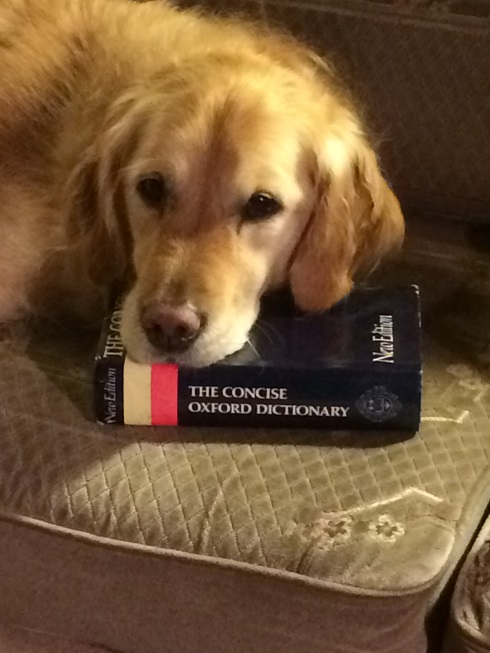 What a gorgeous bundle of love and fluff! This was Alfie, six years ago, just before he came to live with us. He was the typical Andrex puppy, large pawed, appealing, cuddly and very, very naughty. He wasn’t much bigger than the Virginia Creeper leaves that littered my patio and had a wonderful time playing in the snow that arrived soon after he did.
What a gorgeous bundle of love and fluff! This was Alfie, six years ago, just before he came to live with us. He was the typical Andrex puppy, large pawed, appealing, cuddly and very, very naughty. He wasn’t much bigger than the Virginia Creeper leaves that littered my patio and had a wonderful time playing in the snow that arrived soon after he did.
 And this is Alfie now. During the last six years we have had more than our share, perhaps, of drama with him. Serious gastroenteritis at five months which made him very poorly and required surgery, anaphylactic reaction to his first booster and a ruptured cruciate ligament two years ago which meant two more operations in 2013 and lots of special attention including physio. Despite all of that, he is full of beans and love (except for the postman who apparently delivers dynamite through our letterbox most mornings) and although he is intelligent enough to have become well trained he is also capable of stealing and eating a whole loaf of bread if he can reach it.
And this is Alfie now. During the last six years we have had more than our share, perhaps, of drama with him. Serious gastroenteritis at five months which made him very poorly and required surgery, anaphylactic reaction to his first booster and a ruptured cruciate ligament two years ago which meant two more operations in 2013 and lots of special attention including physio. Despite all of that, he is full of beans and love (except for the postman who apparently delivers dynamite through our letterbox most mornings) and although he is intelligent enough to have become well trained he is also capable of stealing and eating a whole loaf of bread if he can reach it.
Passage of time. We started with a cute puppy, struggled through the awful, chewing, gawky teenage stage and agonised every time he was seriously ill or needed anaesthetics. Now we have a grown up dog who is a wonderful companion and gets us out in the fresh air whatever the weather. And time will continue to pass and one day we will have to say goodbye. No-one knows when a life will end but dogs usually don’t live as long as human beings and big dogs, especially ones with dodgy legs, have shorter lifespans than smaller ones. It’s likely that, one day, I will have to make the dreadful decision that no pet owner wants to make.
Despite this knowledge, I don’t want to stop time and keep Alfie how he is right now. Neither do I wish he was still a cute puppy, and that isn’t just because of the chewing and house training! Painful as it might be at times, I am willing to allow him to grow older, to embrace the changes, the ebb and flow of life and the inevitability of deterioration.
Everything that lives decays and eventually dies. Shakespeare’s Gertrude said it to her son, Hamlet:
‘Thou know’st ’tis common; all that lives must die,
Passing through nature to eternity.’
Movement, change, impermanence and eventual destruction are essential elements of life. Without them life would not be life. Death, perhaps then, is not the opposite of life but its affirmation.
And although we might find the kind of impermanence that results in loss, or makes us fear loss, unpleasant, resisting this impermanence doesn’t help us.
Resistance to impermanence is everywhere:
Consider our appearance-obsessed society peppered with exhortations to freeze time by keeping our youthful looks,
And the many – quite understandable – social media posts by parents exclaiming at how fast their children are growing up and wishing they could stay little for a while longer.
While it’s natural to want to resist the passage of time and the signs that our lives are runnng out by the moment, it’s not only futile but also damaging.
This is the nature of life: hurtling through time towards inevitable physical deterioration and destruction, while dwelling all the time in the ever present Now. If we try to stop, freeze, deny or even reverse the inevitable passage of time, pretend that impermanence can be avoided, we also avoid and miss out on the essence of life, the very nature of living itself.
Yes, impermanence hurts. We don’t want to lose the people and things we hold dear, including our pets, our looks, our health and our hard-earned way of life. But when we stop going with the flow, if the flow is life itself, then our existence loses its depth, its spice, its texture. We deny the very preciousness we are seeking to hold on to.
So when I look at Alfie, and remember him as a puppy, and know that he will grow old, I know that our lives are moving along together for a while and in the bitter sweetness I am in awe of this process.
I practise allowing the flow because it’s the only way to experience the fullness of life as I move through it.
What are you holding on to? If you allow it to change, to leave, to decay, to disappear, will that loss happen any sooner? Would resting into the inevitability of impermanence really make things fall apart? Or by allowing change and loss would you, possibly, be opening a door to life?